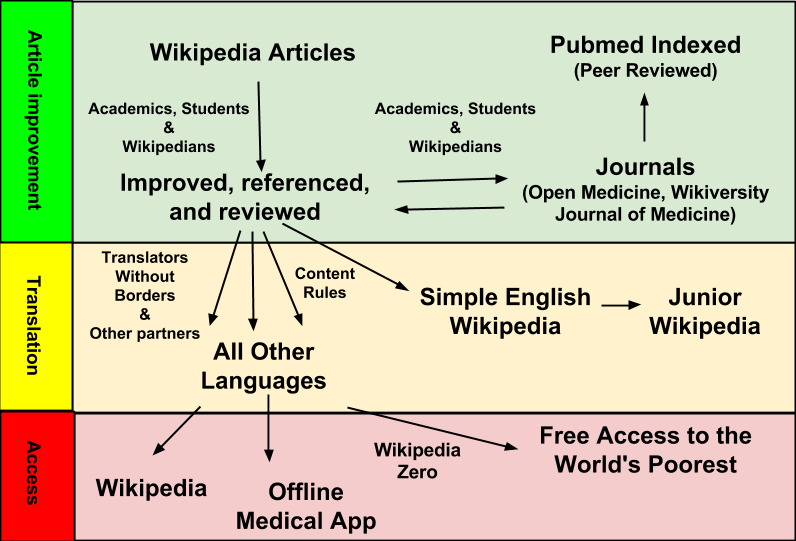
This post was written by Wikimedia UK Associate Dr Martin Poulter
Misconceptions about health are common throughout the world. For example diarrhoea patients respond well to oral rehydration therapy, but there are widespread beliefs that a child sick with diarrhoea needs to be given less fluids rather than more.
The research exists to refute those misconceptions, and if it were widely available it could be a huge step forward for public health. However, there are three big problems with the research: 1) it is often behind a “paywall” rather than on free access, 2) it is too technical for the general public, and 3) it is usually in English. Wikipedia, being freely available in hundreds of languages, is ideal for making this useful, relevant and reliable medical information accessible to the global public.
Wikiproject Medicine is a group of health professionals, academics, students and others who work to improve the quality of medical articles on English Wikipedia. They are currently concentrating on a core of eighty articles, improving them to a comprehensive, professional standard that reflects the most trustworthy current research. The articles include HIV/AIDS, Pregnancy, Tuberculosis, and Dengue Fever.
Other collaborators, including a group called Translators Without Borders, are translating these articles into other languages. Each different language version of an article is being translated by a native speaker, many with medical qualifications. This involves a lot of work: even an article that’s available in the ten most popular languages will reach less than half of the world’s population. To reach most of the world, the information needs to be in dozens of languages. You can follow the progress of the translation project, or take part, through dedicated pages behind the scenes of Wikipedia.
Wikipedia’s licence gives readers the freedom to redistribute articles on disk, on paper, or even as audio, so information can potentially reach people with no internet connection, no computers, or even no literacy. An important development for getting this information to some of the poorest countries is Wikipedia Zero. This is an agreement between the Wikimedia Foundation and mobile data providers serving Africa, the Middle East and South-East Asia. It lets people read Wikipedia on their mobile phones without being charged, potentially reaching hundreds of millions of people who until recently have been information-poor.
Each step in this chain – article improvement, translation and free access – is worth doing for its own sake. Together they achieve something even greater: reliable, relevant health information for billions.
There are benefits within the health profession, too. Wikipedia has very demanding requirements for the sources of medical information, giving the greatest weight to reviews of the highest quality research. Training people to contribute is a way to encourage this evidence-based approach to medicine.
Wikimedia UK’s role in this effort is to help health professionals contribute to Wikiproject Medicine. At a recent event hosted by University Hospitals Coventry & Warwickshire NHS Trust and supported by Wikimedia Canada and Wikimedia UK, fifty health professionals learned about Wikiproject Medicine and how to improve medical articles on Wikipedia. Librarians Helga Perry and Petra Meeson gave entertaining and useful talks about evidence-based medicine and its alternatives. Jon Brassey demonstrated the TRIP database, a search engine tailored for evidence-based medicine. Jacob Wolff, founder of Wikiproject Medicine, said that he became a Wikipedian for the same reason he became a doctor: to help ordinary people benefit from the findings in medical research literature. James Heilman – a Canadian doctor and very active Wikipedian – gave a presentation on which I’ve based most of this post.
This project builds on our collaborations with the Medical Research Council and Cancer Research UK. We hope the medical community throughout the UK will join us in this effort and invite Wikimedia UK trainers into their workplaces. Contact info@wikimedia.org.uk if you are interested in a similar event in your own institution.





